Friends began in 2005, with a new Board that did not have experience in grant writing. Our monies only came to us by relatively passive efforts, bequeaths and donations. For years and, in part continuing to present, the main purpose/project was to provide small financial grants to help an individual consumer of NCBVI. The most common grant type had been the purchase of needed medications, food and/or lodging for NCBVI’s consumers who were in a phase in the rehabilitation process where the Commission IS NOT legally able to fund this type of service. Although our assistance in these cases may be small, it can prevent failure in a successful outcome of the rehabilitation process. None of these types of expenditures are included in our list.
As you view the below accomplishments, the involvement of Friends will show a developmental progression of our expanding partnership with NCBVI. Friends has grown from an emergency resource for small funding needs to a more substantial contributor of funds for programs; a consultive and/or seat on some of NCBVI’s program activities and partnerships with other state and national rehabilitation services for people who are blind or DeafBlind.
If you are an individual or the representative of a giving foundation, please look at our Funding Us page. Besides getting information about how to donate, you will also see who believed in Friends’ mission to support the work of NCBVI. Note: a vocational rehabilitation program (VR) with the goal of getting people to again function independently, employed and paying in taxes rather than being on various types of tax-supported services or benefits, VR programs are one of the very few services that actually makes the government money!
Accomplishments to date are presented below, starting with the most recent.
2025
For the SSP three year test project, Friends contributed our third and final $10,000; this was funding granted by the Ethel S. Abbott Charitable Foundation. With the start of the 2026 Nebraska legislative session, the deafblind community and its supporters will provide information to all Senators of Nebraska’s Unicameral with the results of the SSP project’s success and how it would benefit people who are deafblind, their families, communities and the State of Nebraska.
Note: If needed, Friends will attempt to set up additional SSP Test Projects; for example, in Lincoln and/or other sections of the state.
2024
Friends contributed $10,000 for the second year of the SSP test project; this was funding granted by the Ethel S. Abbott Charitable Foundation. Its success would lead to finding long term funding to cover the entire state.
Friends again funded Project Independence, $25,000; funding granted to Friends by the Stanley M. Truhlsen Family Foundation Inc. Project Independence was held from Sunday July 23rd through Thursday July 27th at Camp Calvin Crest in Fremont, NE. The theme was “Entering the Independence Era”. A total of 11 campers attended PI. The campers utilized learning shades (blindfolds) to focus on their other senses and gain skills over a wide variety of fun and engaging experiences. This started with a blinging-out learning shades along with an obstacle mobility course activity to learn the various places at camp. Campers used either hard copy braille or a phone app called Seeing Ai to read the obstacle instructions. (Seeing AI has several functions useful for the blind, and reading text is one of them.) Campers learned how to play Human Foosball with a beeping ball! They also had water fun with swimming and water splash balls. Campers learned alternatives for painting a Balloon Powered Boat craft activity and racing them in rain gutters against their peers. Campers also had the opportunity to experience an Air Boat Ride Tour on the river.
Campers learned non-visual skills through classes in Homemaking, Braille, Techniques of Daily Living, Cane Travel, and the annual Home Chore Challenge. In Homemaking, students learned cooking alternatives for mixing, measuring, using the oven and microwave using Braille recipes. They also used the iPhone to set a timer for baking. In Tasks of Daily Living, students learned alternatives for brushing teeth, making the bed, and using the Seeing Ai app.
The Home Chore Challenge gave students the opportunity to learn pouring skills, hanging up clothing, vacuuming, and taking out the trash. Using the stopwatch to time each person as they did each chore, to see how much they improved each time they completed a task.
They explored the world of employment and operated their own PI Futuristic Yogurt Shop. Each camper was assigned a specific job, such as Cashier, Yogurt Maker, Dishwasher and Table Busser. They were excited to have a job and to also be the customer!
Campers also shared in seminars about blindness and being self-advocates at home, school, and work. We also addressed social skills throughout the week, eating techniques, being a good listener, following instructions, and being kind. Students had a fun time at the Wildlife Safari Park in Ashland, Urban Air Trampoline Park in Omaha, Jimmy John’s lunch in the park, hanging in hammocks and making smore’s in the microwave. Each student was provided a pair of learning shades, pop-up mesh hamper, a Balloon Power Boat, Braille Phase 10 card game, a liquid level indicator and a camp t-shirt to take home. Transportation was provided for campers to and from the activities. Each student was able to expand their belief in themselves, gain independence and build confidence as the week progressed. At the closing seminar with families, campers shared something they accomplished and a highlight of the program.
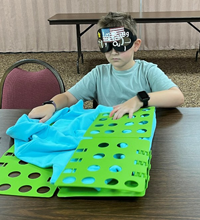
Caption: 2024 camper learning to fold a shirt
Link to Larger Photos Page
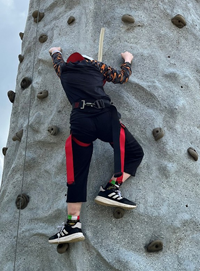
Caption: 2024 camper rock climbing
Link to Larger Photos Page
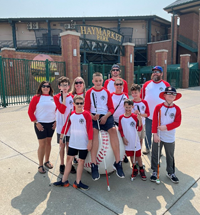
Caption: 2024 group of campers at Haymarket Park
Link to Larger Photos Page
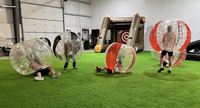
Caption: 2024 campers playing knockerball
Link to Larger Photos Page
2023
We are contributing funds and will be an active partner of a new multi-agency effort to create a statewide program to provide support services to individuals who are DeafBlind, with the goal to expand their independence. Though DeafBlind citizens of Nebraska have always gotten equal attention by NCBVI, this year the Commission has joined a partnership with the Nebraska Commission for the Deaf and Hard of Hearing, and Helen Keller National Center to start up a three year test project to hire, train and assign trained Service Support Providers (SSP) to individual DeafBlind persons; there are 38 other states who have taken this route, and found it increased the quality of life for the DeafBlind and decreased the need for state government funding. We will contribute $10,000.00 per each of the test years: our 10K covers the costs of one calendar month; giving 15 hours use of an SSP; for 15 deafblind Nebraskans. At the conclusion of this test project period, the deafblind community and the Nebraska based members of our coalition will then make a pitch to the Nebraska legislature to fund this new SSP program.
Friends again funded Project Independence; $25,000; funding granted to Friends by the Stanley M. Truhlsen Family Foundation Inc. Project Independence 2023 was held from Sunday, July 21st through Thursday, July 25th at Camp Calvin Crest in Fremont, NE. The theme was “Achieving My Gold Medal to Independence”. A total of six campers attended this year’s program, the smallest group ever, and they were all boys. The campers utilized learning shades (blindfolds) to focus on their other senses and gain skills over a wide variety of fun and engaging experiences. This started with a blinging/decorating of their learning shades.
Campers visited Fontenelle Forest for ziplining and rock climbing, providing them with the opportunity to try new and fun challenging activities. They also had two nights of swimming, including Olympic theme swimming pool games! Campers learned alternatives for making a loom bracelet that they got to take home. They had the opportunity to explore sports court of a baseball field and later in the week play a game of Beeping Base Ball with their peers and staff.
Campers learned non-visual skills through classes in Homemaking, Braille, Techniques of Daily Living, Cane Travel, and the annual Home Chore Challenge. In Homemaking students learned cooking alternatives for mixing, measuring, using the oven and microwave, plus employing braille recipes. They also used the iPhone to set a timer for baking and read a recipe with Seeing AI (an app that has several useful functions, like reading print aloud.) In Tasks of Daily Living, students learned alternatives for folding shirts, making peanut butter and jelly sandwiches, making a Mio drink and cleaning skills. Each day they also practiced cleaning up their rooms. On the last day, as a demonstration, the students and teachers put on the Home Chore Challenge. This gave students the opportunity to practice the TDL’s they learned earlier in the week. Using the stopwatch to time each person as they did each chore, to see how much they improved each time they did a task.
They explored the world of employment and operated their own PI Champions Concession Stand. Each camper was assigned a specific job, such as Cashier/Manager, Concession Stand Server, and a Beverage & Popcorn Stand Server. All the campers were excited to have a job and to also enjoy the customer experience! After the concession stand they enjoyed watching a descriptive movie, Cool Runnings. Campers shared in seminars about blindness and being self-advocates at home, school, and work. Also addressed throughout the week: social skills, eating techniques, being a good listener, following instructions, and being kind.
Students took a field trip to Lincoln, touring the Haymarket Baseball Park, lunch and games at Mana Games and met a WAGES (Work And Gain Experience, a program for blind teens working a summer job) participant who shared his experiences. They also had a fun time at Nebraska Knocker ball for some inflatable fun! They cane traveled to the hammocks to relax and learned how to make Smore’s in the microwave.
Each student was provided with a pair of learning shades, pop-up mesh hamper, the bracelet loom, a tactile Rubik’s cube, a whistling nerf football and a camp t-shirt, all to take home. Transportation was provided for campers to and from the activities. Each student was able to expand their belief in themselves, gain independence, and build confidence as the week progressed. At the closing seminar with families, campers shared something they accomplished and a highlight of the program, receiving their gold medal to independence.
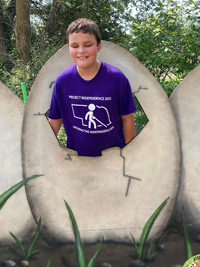
Caption: 2023 camper posing in a dinosaur egg at Wildlife Safari
Link to Larger Photos Page
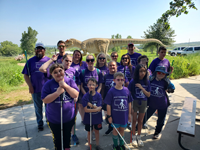
Caption: 2023 group of campers at Wildlife Safari
Link to Larger Photos Page
2022
Friends granted $20,000.00 to cover costs for NCBVI’s Project Independence (PI); for ages 9-13, a yearly event since 1983. PI was held July 24th through July 29th. The theme was “Adventures in Technology: Problem Solving with Technology for Home, School, Work and Fun!” A total of 13 campers attended Project Independence. The campers utilized learning shades (a blindfold) that they decorated to focus on their other senses and gain skills over a wide variety of fun and engaging experiences. This started with a scavenger hunt activity to learn the various places at camp. Campers used an App called Seeing AI to read the clues. Campers learned how to play beeper baseball with audio beeping balls and audio bases, and played frisbee golf with adapted frisbees with Apple Air Tags attached for audio that were synced to an iPhone. Campers created art on a canvas frame using tactile materials (yarn, puffy paint, and stencils), and learned how to use a 3-D Doodle Pen to create their own tactile art.
Campers learned non-visual skills through classes in Technology, Homemaking, Braille, Techniques of Daily Living, Cane Travel, and the annual Home Chore Challenge.
A major focus was on Technology. Each student received an iPad with accessible apps installed (Seeing AI and Talking Typer), an iPad case with Bluetooth keyboard, a backpack, a pair of earbuds, a braille keychain, an iBill, a 3D Doodle Pen, and a camp t-shirt to take home. Students learned how to use both Voiceover and Siri to complete the following tasks: Unlock iPad, Adjust Voiceover and Siri settings, Open apps and learned how to navigate the Talking Typer app by successfully completing typing lessons and games. They asked Siri to get information, such as finding out the time, weather or to how to spell words. Students also learned how to power off, power on and charge the iPad, as well as how to pair and charge the Bluetooth keyboard.
In Homemaking, students learned cooking alternatives and used the Seeing AI app to scan and read the recipes and to identify cooking products by scanning the product barcode. They also used the iPad to set a timer for baking. In Braille class students were introduced to a slate and stylus, a braille notetaker, a braille display, and some listened to Alexa read a story while following along with the braille book, to help with reading speed and comprehension. In Tasks of Daily Living, students learned how to use an iBill device to identify different denominations of money, how to use a talking alarm clock, and how to set an alarm on the iPad. The Home Chore Challenge gave students the opportunity to learn and practice folding towels, sort silverware, clean up a sticky mess, and how to identify products using Seeing AI to scan product barcodes.
They explored the world of employment and operated their own PI Ice Cream Shop. They met a blind employee at the Lincoln State Office Building who shared her experience of using technology on the job (a talking cash register and Seeing AI App). Students learned about the pros and cons of having a guide dog from NCBVI Staff, Charlie. Also addressed throughout the week were social skills, eating techniques, being a good listener, following instructions, and being courteous. Each student was able to expand their belief in themselves and gain independence as the week progressed.
Students also had fun times swimming, bowling, hanging in hammocks, watching an audio descriptive movie, and enjoyed making smore’s at a campfire.
Parent: ”I was so pleased to hear how independent that my daughter has been this week and all she has accomplished. I can’t get her to do anything at home. I now know that I need to have these expectations and that we need to be involved in more activities with NCBVI.
Student: “This was my first year, I wasn’t so sure about attending, but now wish it was 2 weeks long. I made a lot of new friends, friends that have accepted me. I really learned a lot.”
Craig Huffman, Calvin Crest Camp Director: “I don’t think that you realize the impact that this program has on educating the public about blindness. We have people that come and go throughout the week, and they remark that they have stood and watched students and staff. That they are excited to see student learning to be independent and fully involved in all activities. That it is obvious that vision loss doesn’t limit them. These students are the most respectful group we have all summer.”
In our proposal for this PI program, we stated that we would provide three quarterly sessions to follow up on the technology training, to be held at the Aurora Leadership and Retreat Center in Aurora, Nebraska. We are working with JB & K to help coordinate these three training sessions. There are additional skills and apps we will be addressing at each of these sessions.
We will be incorporating a parent seminar where we address the importance of elevated expectations of their child. They will observe how we work with students, the skills they are employing and that these same expectations should follow them as they return home. In future sessions we will provide parents with information about their rights in the IEP process. Having social, technology and blindness skills are all vital to a successful future. The funding for this program is making a difference in the lives of each of these students.
2021
This was the first year that Friends was not only able to again pay for the t-shirts for Project Independence, but to provide funding to cover some of the overall costs of the program itself; $1,500.00! Our board now has two members with strong experience of grant writing, and we look forward to hopefully being able to contribute a goodly amount of funding on a yearly basis. This year the theme for Project Independence was Soaring to Independence! We were super excited that this summer NCBVI was able to have Project Independence Camp in person; 2020 was via Zoom, with materials being shipped to the homes of each participant!
2019
The 2019 year’s theme for PI was Independence is EPIC! And in an effort to be more cost effective, each camper made an EPIC Tie-Dye T-shirt to have as a keepsake of PI. Friends did pay for the blank white T-shirts used.
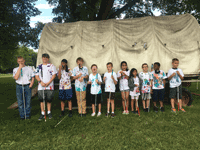
Caption: students stand in front of large covered wagon, canes in hand, wearing their tie-dyed t-shirts
Link to Larger Photos Page
2018
The 2018 PI T-shirt had a superhero theme!
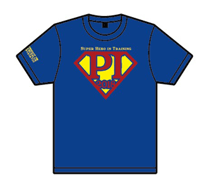
Caption: royal blue t-shirt with logo Super Hero in Training, PI 2018
Link to Larger Photos Page
2017
Starting off this year, Friends established a unique program called Access to Nonvisual Technology for Seniors (ANTS). Friends took note of services for the older blind provided by NCBVI was being scaled back. The total visits per program, for counseling and instruction, decreased from ten visits to four. In addition, only low-tech equipment was being supplied for independent living skills; no computer access software for computers, nor provision of expensive magnification devices were being provided. Thus, seniors were not getting a chance to regain key skills that would allow them to carry on with important personal and family responsibilities. And there was no other Nebraska service to step in to help complete needed instruction. Friends decided that within our limited resources we could step up to aid some of these seniors to learn what they needed to know. This could be an opportunity to build a framework of post-rehabilitation services, carrying on instruction after a government funded program had run its course. Excitingly, we would hire competent users of the very equipment being taught; the instructor would be legally blind and we paid them an hourly wage of $30.00.
Note: Six months after the kickoff of this unique program, with several successful trainings on the books, this service was no longer needed. For NCBVI, with help from the National Federation of the Blind and Friends, were able to convince the Nebraska legislature to increase the state funding for independent living services, of which the older blind services is covered. NCBVI was able to increase the number of staff and visits to provide needed services to the older blind.
2017
In 2017, the T-shirts had the theme "We Put the PI in Pioneer: Exploring my Future Frontier", which was inspired by Nebraska's 150th birthday.
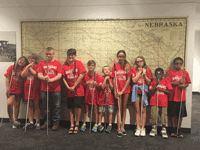
Caption: Students stand in front of a huge map of Nebraska, canes in hand
Link to Larger Photos Page
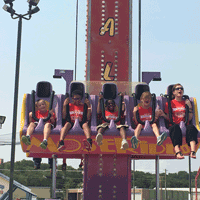
Caption: students beaming widely on free fall amusement ride
Link to Larger Photos Page
2016
The first ever request from one of the Commission’s internal programs came to us in 2016. Staff requested that We cover the cost of T-shirts for the students and staff of the annual stay-over summer camp Project Independence (PI) program; a combination learning blindness skills and confidence to take on family responsibilities and social skills. Participants range in age from 9-13.
Needless to say… We were super happy that we finally got on the radar of the Commission’s staff as a resource to cover needed program expenses, rather than just for the occasional individual client. Note: The Commission has to seek outside funding to cover the costs of matching T-shirts for a program, because the FEDS viewed monogramed T-shirts as a form of a uniform, and forbid the use of tax dollars to purchase them.
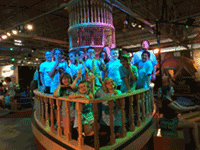
Caption: In 2016, All campers and counselors wore the shirts on the field trip day to Omaha; the theme was “Come Sail Away With Me.”.
Link to Larger Photos Page
2014-2015
We created a grant opportunity that we called Blindness Education Enrichment Grant, aimed to provide monies to Nebraska-wide, approved non-NCBVI programs serving blind youth. We felt that this effort would not only serve to help blind youth but help us build bridges among the better Nebraska programs and Friends. Read the text immediately below to learn of how we presented our criteria for interested non-NCBVI grantees.
Our Grant Notice: Friends of the Nebraska Commission for the Blind and Visually Impaired is pleased to announce the availability of a Blindness Education Enrichment Grant of up to $1000 to support a worthy project benefiting blind youth in Nebraska. Friends is a nonprofit entity established to both supplement and compliment the work of the Nebraska Commission for the Blind and Visually Impaired (NCBVI) as it seeks to fulfill its mission of empowering blind individuals, promoting opportunities, and building belief in the blind.
As a government agency, NCBVI operates under laws and regulations which sometimes limit its ability to fully serve the entire population of Nebraskans who are blind. For example, the funds are limited for services to blind and visually impaired persons under the age of 14. Yet we know that those who develop effective alternative skills at a young age dramatically improve their odds of achieving success later in life. The board of Friends believe we can enhance skill building opportunities for this population by offering Blindness Education Enrichment grants, thereby better preparing young blind adults to benefit from NCBVI’s transition services when they become eligible for them at age 14.
The first year of Friends Blindness Education Enrichment grant offering we received two applications. Both were found to be worthy and after much discussion, the following decisions were made: We would grant the full $1,000.00 to Camp Abilities Nebraska, an overnight week-long residential sports camp for children and teens who are blind, visually impaired, or deaf-blind; some NCBVI consumers attend this camp.
Additionally, to the second applicant we decided to donate a sum of $300.00. The Braille Enrichment for Literacy Learning program (BELL) was sponsored by the National Federation of the Blind of Nebraska. This program was a day camp, spanning two weeks. It was designed to introduce children between the ages of four and 12 who would not normally receive instruction in braille to the wonders and capabilities of the only method of true literacy for the blind.
In our second year of the Blindness Education Enrichment Grant, Friends received three applications. Two were repeats from last year’s applicants, and one new: Camp Abilities Nebraska; the NFB’s Braille Enrichment for Literacy Learning (BELL), program; and Project VIEW, from the Department of Special Education and Communication Disorders, University of Nebraska, Lincoln.
We did grant the full $1,000.00 to the National Federation of the Blind’s Braille Enrichment for Literacy Learning, program (BELL). This program was a day camp, spanning two weeks. It was designed to introduce children between the ages of four and twelve who would not normally receive instruction in braille to the wonders and capabilities of the only method of true literacy for the blind.
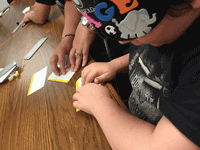
Caption: Gage reading a braille recipe at a table where others are reading and writing braille
Link to Larger Photos Page
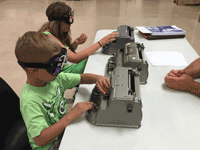
Caption: Mykell and Brook exploring and learning to use a Perkins Braille Writer
Link to Larger Photos Page